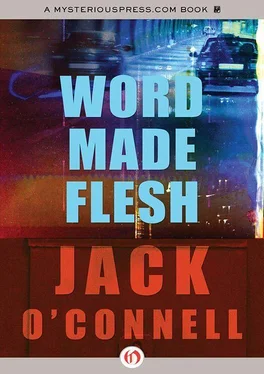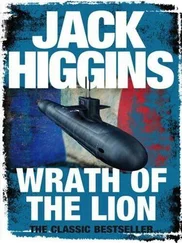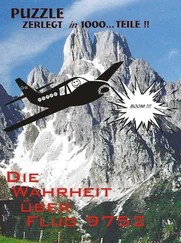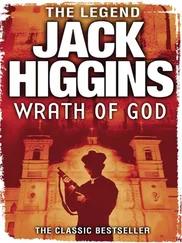“I don’t have any book, Oster.”
Rafael’s chest is heaving and blood is running down his chin nonstop. He brings the pipe back over his right shoulder. Subash forces his way to his feet, lifts his brick back behind his right ear in a pitcher’s stance. They start to slowly circle each other, the crowd loving it, screaming down advice or insults at the two fighters in a language that neither one can understand.
Oster stands up slowly, catches Stewie Green’s eye, makes some kind of hand gesture that Green confidently nods a response to. Green climbs up on a pile of bricks and starts to call out three equally accented and slightly elongated syllables: Raf — a—el, Rat — a—el— and the crowd picks up on it immediately, making it into a group war chant that grows louder in volume with each recitation, a ceremonial egging-on of the kid with the pipe, an aural talisman with the power to turn a desperate refugee with little understanding of how and why he ended up in this moment, into some kind of mythic warrior ready, with the aid of a length of planted lead water pipe, to dispense a messy death to a weaker enemy.
Bobby Oster sits back down and says, “I’ve always thought you and I were a lot alike, Gilly. Almost like we’re brothers. Like one of those old stories, you know? We’re separated at birth and we meet up years later …”
He trails off, shaking his head.
Gilrein says, “I don’t think so. I think it’s more like one of those not-so-old stories where one of us has to rip the heart out of the other. And I think both of us know that.”
“You really didn’t bring the book, did you, you asshole?”
Rafael hesitates, makes a noticeable glance up to Walden. Walden gestures slightly with the Winchester, tipping the barrel down toward the ground. Subash senses something and panics, charges blindly with his brick. But Rafael is too fast. He steps into the charge and bunts Subash in the throat, putting him back down on the ground, choking without sound. Then Rafael straddles the quaking body, a foot on either side of the Pakistani’s hips. Rafael chokes up on the pipe, holds it cocked for several seconds like a young Ted Williams posing for what will become an enormously valuable trading card.
“I wish there were some other way we could have resolved this,” Oster says, staring, unblinking, down on the pit.
Gilrein listens to the chanting die out in an instant, as if by some unseen signal. He says, “You’re going to take me out right here? Some of these people were my friends …”
Bobby Oster says, “Don’t flatter yourself, okay?”
Subash tries to move, his head rolling on his neck as understanding flows back into the brain. He makes a futile and stuttering attempt to gain balance up on an arm. Rafael is blocking Gilrein’s view. Oster moves a few steps to the side, maybe to see if the doomed man’s eyes are open or closed.
Gilrein moves up behind him and says, “I’m not going to just roll over, Bobby.”
Oster shrugs, intent on watching the finale.
“Doesn’t matter what you do, Gilly,” he says. “We come after someone, there’s nothing they can do.”
And then the pipe comes down, flies to the skull with a vicious and simplistic arc, a chop down through the air, fairly graceless but completely effective.
Subash’s skull cracks open. Blood explodes. And to make sure the job is done, Rafael hammers home two more blows, leaving no doubt in the mind of the crowd as to who has won money tonight and who has lost.
All along the walk back through the factory and out to the Checker, Gilrein keeps waiting to hear the explosion of orgiastic bloodlust that the mob has been building toward since the prisoners were led into the pit. But the air behind him is void of any sound beyond the muted echo of Oster’s bullhorn announcing something unintelligible.
As he approaches the cab, Gilrein notices someone in the driver’s seat. He takes his gun from his rig and continues to walk, holding the piece down at his side. A few more yards and the face behind the wheel is recognizable. Gilrein leans on the passenger window and waits for an explanation.
When it becomes clear the intruder has no intention of offering the first words, Gilrein says, “I’m sorry, Inspector, I’m off duty.”
He gets a throat-clearing noise in response.
“You’ll have to find another ride,” Gilrein says, more forcefully.
The old priest reaches to the roof and switches on the cab’s dome light, then smiles and opens his mouth as wide as it will part to reveal a hole swollen with white, oozing pustules.
“Jesus,” Gilrein says, recoiling.
Lacazze lifts his hands in the air like a surgeon, or a monk ready to consecrate a wafer. The hands are covered with similar nodules and swollen to the point where the fingers resemble overstuffed sausages.
Gilrein subdues the impulse to bolt away from the cab.
“I need to speak with you,” Lacazze says, the voice phlegmy and choked, as if both his lungs and his larynx were slightly constricted. “It’s about Ceil.”
“What about her?”
The Inspector shakes his head and says, “Not here.”
They stare at each other until, unsure of what else to do, Gilrein takes the keys from his pocket and tosses them through the window, then climbs into the backseat, a passenger in the Checker for the first time since childhood.
Though he left it in the glove box, he finds Ceil’s notebook on the seat next to him, a place near the end of the journal book-marked with the band from a Magdalena cigar.
“I hope you don’t mind,” Lacazze says into the rearview as he starts the cab and rolls out of the lot. “I marked a passage I thought you might find useful.”
The Checker picks up speed down Rome Avenue. And, against what’s left of his better judgment, Gilrein begins to decode the last message from his wife.
Z. Dear Gilrein:
You are sleeping, once again, as I write this, turned on your side, knees hunched up slightly. You’ve kicked the sheets off and I know that in ten minutes you’ll be shivering. As I wrote that last line you let out that noise, that half moan, half sigh that signifies the deepest point of your dreams. I’ll confess now that the noise annoyed me slightly when we first slept together. But lately I’ve come to find it reassuring. Don’t ask me, yet, what I need to be reassured about.
This letter is to be an apology, though I know there is a good chance you will never come to read it. But letters are created as much for the benefit of the writer as for the intended recipient. Maybe more for the writer. And, in any event, once again, I cannot sleep.
Husbands and wives are thought to possess secret knowledge of one another. And in a manner, of course, they do. But the common wisdom will never understand what the long-married know, most viscerally, at times like now, at four o’clock in the morning, when life in the perfect bungalow seems somehow most in jeopardy. And what we know is this: no matter how much we want to give ourselves away, some adamant core refuses to yield, some recalcitrant center will never fully give. And no matter how much we want to receive the Other, in no matter how perfect a totality, our capacity is always wanting.
This has to do with an inherent sense of personal identity, an essential individuality. It also has to do with the inadequacy of human communication. There are things we simply can never convey.
But I need to go back now and try anyway. I need to make the attempt in spite of my knowledge of a predestined failure. I need to talk about that first night. Our first extended parcel of time spent together. When you drove me around this wounded city from eleven o’clock at night until seven o’clock the next morning. As if that initial and unofficial “date” had been a work shift.
Читать дальше












